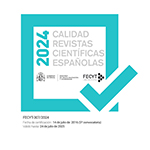Cooperation networks between authors and institutions in Social Sciences within the Colombian scientific model: comparison by gender and area of knowledge
Abstract
This study analyzed the structural properties in networks of co-authorship and institutional
collaboration in Social Sciences, based on articles published between 2006 and 2015 by 3,804 authors
from seven disciplines. The structural characteristics were calculatedthrough Social Network Analysis
and were compared according to the gender of the authors and areas of knowledge. No significant
differences were found in relation to gender, but disciplinary differences were observed in the
closeness and relative importance of the authors. The institutional networks showed low density, high
fragmentation and little cohesion. In the social sciences in Colombia the number of women with
productivity similar to men grows; institutionally, strategies are needed to stimulate cooperation to
improve the impact of productions.
Downloads
Article download
License
In order to support the global exchange of knowledge, the journal Revista General de Información y Documentación is allowing unrestricted access to its content as from its publication in this electronic edition, and as such it is an open-access journal. The originals published in this journal are the property of the Complutense University of Madrid and any reproduction thereof in full or in part must cite the source. All content is distributed under a Creative Commons Attribution 4.0 use and distribution licence (CC BY 4.0). This circumstance must be expressly stated in these terms where necessary. You can view the summary and the complete legal text of the licence.











